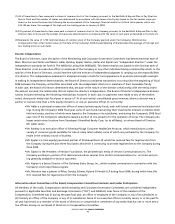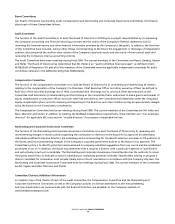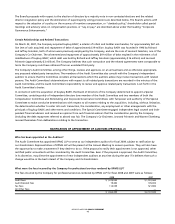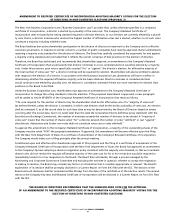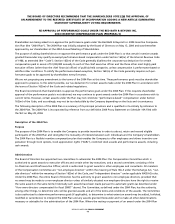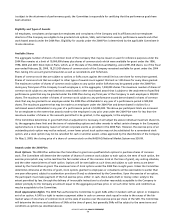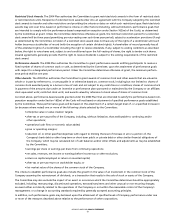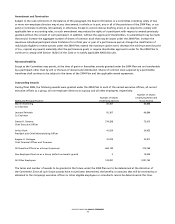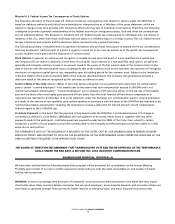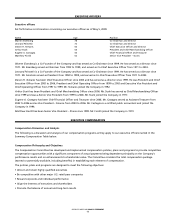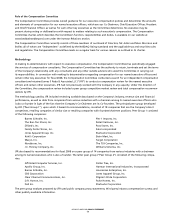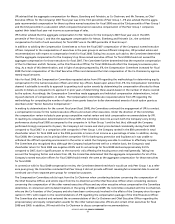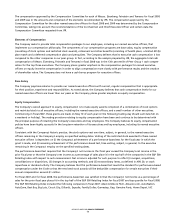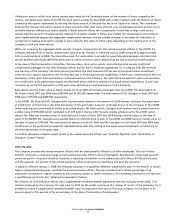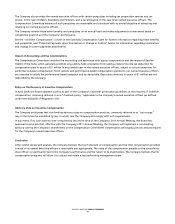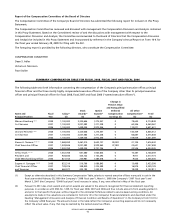Bed, Bath and Beyond 2008 Annual Report Download - page 55
Download and view the complete annual report
Please find page 55 of the 2008 Bed, Bath and Beyond annual report below. You can navigate through the pages in the report by either clicking on the pages listed below, or by using the keyword search tool below to find specific information within the annual report.
BED BATH & BEYOND PROXY STATEMENT
53
Material U.S. Federal Income Tax Consequences of Stock Options
The following discussion of the principal U.S. federal income tax consequences with respect to options under the 2004 Plan is
based on statutory authority and judicial and administrative interpretations as of the date of this proxy statement, which are
subject to change at any time (possibly with retroactive effect) and may vary in individual circumstances. Therefore, the following
is designed to provide a general understanding of the federal income tax consequences (state, local and other tax consequences
are not addressed below). This discussion is limited to the U.S. federal income tax consequences to individuals who are citizens or
residents of the U.S., other than those individuals who are taxed on a residence basis in a foreign country. The U.S. federal income
tax law is technical and complex and the discussion below represents only a general summary.
The following summary is included herein for general information only and does not purport to address all the tax considerations
that may be relevant. Each recipient of a grant is urged to consult his or her own tax advisor as to the specific tax consequences
to such recipient of the grant and the disposition of common stock.
Stock Options. In general, an optionee will recognize no taxable income upon the grant of a non-qualified stock option and
the Company will not receive a deduction at the time of such grant. Upon exercise of a non-qualified stock option, an optionee
generally will recognize ordinary income in an amount equal to the excess of the fair market value of the common stock on the
date of exercise over the exercise price. Upon a subsequent sale of the common stock by the optionee, the optionee will recognize
short-term or long-term capital gain or loss, depending upon his holding period for the common stock. Subject to the limitations
of Section 162(m) of the Code and Section 280G of the Code (as described below), the Company will generally be allowed a
deduction equal to the amount recognized by the optionee as ordinary income.
Section 162(m) of the Code. Section 162(m) of the Code denies a deduction to any publicly held corporation for compensation
paid to certain “covered employees” in its taxable year to the extent that such compensation exceeds $1,000,000 and is not
“performance-based compensation.” “Covered employees” are a company’s chief executive officer on the last day of the taxable
year and the three other most highly paid executive officers (other than the chief financial officer) whose compensation is
required to be reported to stockholders in its proxy statement under the Exchange Act. Compensation paid to covered employees
as a result of the exercise of non-qualified stock options granted in accordance with the terms of the 2004 Plan are intended to be
“performance-based compensation” enabling the Company to receive a deduction for the full amount of such compensation
without regardto the $1,000,000 cap.
Parachute Payments. In the event that the payment of any award under the 2004 Plan is accelerated because of a change in
ownership (as defined in Code Section 280G(b)(2)) and such payment of an award, either alone or together with any other
payments made to the participant, constitutes parachute payments under Section 280G of the Code, then, subject to certain
exceptions, a portion of such payments would be nondeductible to the Company and the participant would be subject to a 20%
excise tax on such portion.
THE AFFIRMATIVE VOTE OF THE HOLDERS OF A MAJORITY OF THE VOTES CAST BY OUR SHAREHOLDERS IN PERSON OR REPRE-
SENTED BY PROXY AND ENTITLED TO VOTE ON THE RE-APPROVAL OF THE PERFORMANCE GOALS UNDER THE 2004 PLAN AT THE
ANNUAL MEETING IS REQUIRED TO RE-APPROVE SUCH GOALS.
THE BOARD OF DIRECTORS RECOMMENDS THAT SHAREHOLDERS VOTE FOR THE RE-APPROVAL OF THE PERFORMANCE
GOALS UNDER THE BED BATH & BEYOND INC. 2004 INCENTIVE COMPENSATION PLAN.
SHAREHOLDER PROPOSAL (PROPOSAL 6)
We have been notified that the following shareholder proposal will be presented for consideration at the Annual Meeting.
Promptly upon receipt of an oral or written request we will provide you with the name and address of, and number of shares
held by, each proponent.
WHEREAS: Investors increasingly seek disclosure of companies’ social and environmental practices in the belief that they impact
shareholder value. Many investors believe companies that are good employers, environmental stewards, and corporate citizens are
morelikely to generate stronger financial returns, better respond to emerging issues, and enjoy long-term business success.


